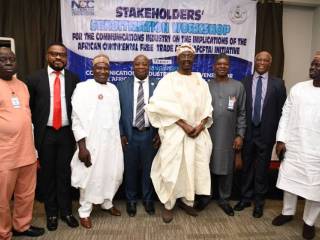A free trade agreement is a commitment by two or more countries to remove tariffs and certain restrictions in order to ensure free movement of goods and services, to improve and increase trading among them. All African countries, save for Eritrea, committed themselves to establishing a free trade area that will make Africa a single market by signing the AfCFTA Agreement.
However, unlike the European Free Trade Area (EFTA) and the North American Free Trade Area (NAFTA), the AfCFTA has birthed the largest trading zone in the world by virtue of the number of participating countries.
In October 2018, NCC was invited to participate in the discussion focused on Nigeria's readiness assessment. On July 7, 2019, President Muhammadu Buhari signed the AfCFTA Agreement at a special summit of the African Union held in Niamey, Republic of Niger.
Therefore, the NCC workshops (in Kano and Lagos), held in partnership with the Nigerian Office for Trade Negotiations (NOTN), were designed to educate telecom stakeholders about the Agreement and to discuss the Nigerian telecom industry competitiveness as Nigeria gets ready to implement the Agreement.
At the moment, Africa's population is 1.2 billion with a projection to reach 2.5 billion by 2050. One implication of this fact for the telecom industry is that Africa's connectivity requirements will increase. It stands to reason that the Nigerian telecom sector requires a re-strategising for the role it will play in the emerging Continental market.
The Executive Vice Chairman and Chief Executive (EVC/CE) of NCC, Prof. Umar Danbatta in his opening remarks at the Lagos workshop affirmed NCC's commitment to driving the telecom component of AfCFTA.
According to him, the NCC's mandate is in congruence with the Federal Government's "aspirations to advance Nigeria's economic development through continuous encouragement of pro-trade, pro-business, pro-investment and pro-export measures".
The EVC, represented by Mohammed Babajika, NCC's Director of Licensing and Authorisation, stated that the overarching objective of the workshop was to educate, discuss to explore deeper understanding, lead discussion on areas of comparative advantage for the Nigerian telecom stakeholders, and to develop a roadmap to engage the AfCFTA initiative.
Danbatta's submission was amplified and underscored by the Chairman of NCC Board of Commissioners, Otunba Olabiyi Durojaiye in his keynote speech. Durojaiye stated that the telecom sector in Nigeria continued to increase its direct contribution to GDP and indirect impact on all other sectors as a facilitator of economic development. The Chairman of NCC Board said the masterstroke to heightening the contribution of NCC is that "we now have access to extend communication services to 1.2 billion people across the African continent".
Other speakers at the plenary include the Governor of Lagos State, Babajide Sanwo-Olu, who was represented by Hakeem Fahm, the State's Commissioner for Science and Technology; Isiaka Ibrahim, member of the House of Representatives' Committee on Telecommunications; Musa Mamza, National President of Association of Mobile Phones and Allied Products Traders (AMPAT); and Liman Victor Liman, the acting Director General of the Nigerian Office for Trade Negotiations, who presented a synopsis of telecommunications in the context of AfCFTA.
Participants are unanimous in the view that AfCFTA holds great promises for the transformation of the continent because of the observed correlations in factors such as removal of tariffs and trade restrictions, increase in the volume of trade, employment opportunities, prosperity of citizens and economic development.
Indeed, statistics from studies carried out by the United Nations Economic Commission for Africa, indicated that AfCFTA can trigger up to 52 percent increase in intra-African trade. Similar studies by United Nations Conference on Trade and Development (UNCTAD) and the African Development Bank (AfDB) also produced very promising findings in this regard.
The Lagos workshop, which is being attended by many stakeholders, like its forerunner held in Kano, was quite informative and revealing. Several presentations were made at syndicated sessions on the second day of the forum. The papers, and the panel discussions, generated conversations and resolutions on different ramifications of the Agreement. The workshop was quite exploratory and provided much education about the opportunities and threats to telecom services in Africa from 2020 and beyond.
